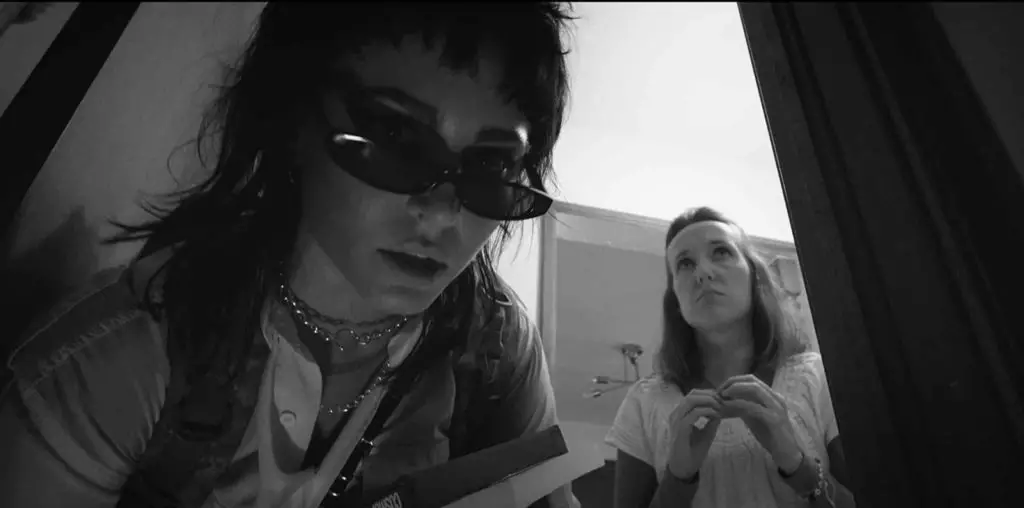
After enduring recent disappointments like “Vanilla Sky” and “The Last Samurai”, I was beginning to think that hooking up with a decent project had become Tom Cruise’s personal mission impossible. It was a refreshing change of pace, therefore, to discover that his latest effort ranks with the most fascinating things he’s put on film.
The actor switches off the megawatt grin and morphs into a stone cold killer for hire in “Collateral”, very likely the darkest buddy film ever made. Michael (Heat) Mann directs and gives contemporary LA the flipside of the treatment he gave Miami in his groundbreaking 80s TV series. Gone are the pastels. The palm trees, four lane drags and skyscrapers are bathed in shades of night that mirror the palette of the character played by Cruise.
Jamie Foxx costars as Max, a cabbie who’s deluded himself into believing the job’s just temporary despite the fact that he’s been doing it for twelve years. He’s a nice guy-observant, philosophical and well-intentioned. He’s just not a doer. Night after night he drives around dreaming of starting his own limo service.
Whereas Vincent is a take charge type. From the moment he takes a seat in the back of Max’s cab, he takes total control. As we ultimately learn, Cruise is in town on business. Flashing six crisp C-notes in his face, he hires Foxx for the night explaining that he has five stops to make in ten hours. He tells the driver that he’s visiting friends but, when the first one plummets four stories and crashes onto the roof of the waiting car, the cabbie can’t believe his eyes. “You killed him!” “No,” Cruise calmly corrects Foxx, “I just shot him. The bullets and the fall killed him.”
Of course, that’s just Vincent’s wise guy side. As he and his reluctant driver work their way through the hitman’s buddy list, the audience discovers others. There’s his jazz aficionado side. After one job, Cruise suggests the two take a break and stop by a little club he’s heard about. What follows is not only one of the best scenes in Mann’s film, but one of the best in any I have seen.
As an ensemble wails, Vincent explains the secrets of jazz to Max-the way the music is just behind the beat, each new phrase an improvised surprise. Then he proceeds to improvise a surprise of his own. He instructs the waitress to invite the trumpet player, the club’s owner, to join them at the end of the set.
Over drinks, the three men talk music and tell stories into the small hours. Barry Shabaka Henley recalls the time Miles Davis walked in and jammed with the band. In a few lines elegantly written by Stuart Beattie, the musician’s life is laid out: His early promise, the things he let get in the way of fulfilling it and the graceful resignation of an old man who knows he blew it. Most whole movies don’t muster the poetry, insight and dramatic power of this one fragment.
As night nears dawn and the body count continues to rise, Foxx realizes that, for once in his life, he is going to have to take action. Cruise’s character practically dares him, calling him on his failure to make his limo company dream a reality and quoting John Lennon, “Life is what happens to you while you’re busy making other plans.”
The picture does eventually arrive at a face off between the two but, as is so often the case, the destination here is not the point so much as the journey. While satisfying in a regulation action movie sort of way, the final act is little more than mandatory punctuation to all the precedes it.
And that’s where almost all the good stuff is: I’m not a big Cruise fan but he had me at “Hey, taxi!” The actor imbues his character with a combination of intellectual depth and moral shallowness that, even in the age of Lecter, proves startling. The interplay between Max and Vincent is conducted by Mann with a virtuoso touch, Foxx displays an unexpected gift for drama and the action sequences are as adrenalized as any in recent movie memory.
Best of all, though, is Beattie’s dialogue. If Cruise had never once gotten out of that cab, “Collateral” would still have been the summer’s most exciting film. You’d have to go back to early Tarantino to find conversation with a comparable snap, crackle & pop.
A genre exercise that transcends its genre, Mann’s taxi driver saga may not quite reach the level of art but, anyway you cut it, it’s anything but standard fare.
